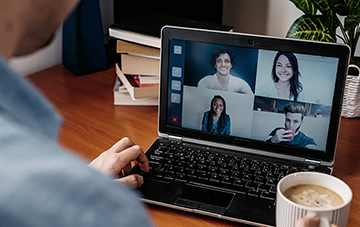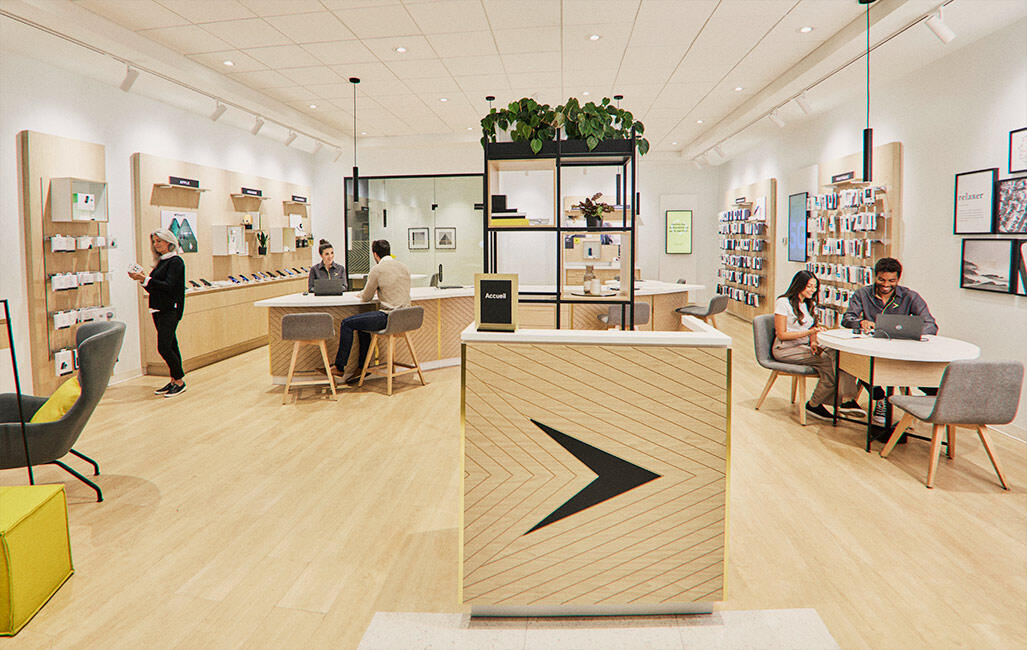
The hotel industry is one of the sectors that has been most weakened by the pandemic. Fortunately, technologies exist that can transform the crisis into an opportunity and put affected businesses back on the path to growth.
Facts
- 67,2% the occupancy rate fell between June 2019 and June 2021.1
- 52% of workers state they would be interested in working remotely while travelling.2
- 65% of event planning professionals believe the hybrid format will become the norm after the pandemic has finally ended.3
The collapse of international and cross-border tourism that resulted from the COVID-19 pandemic has done some damage to Québec’s hotels. In Montréal alone, the occupancy rate fell to 67.2% between June 2019 and June 2021, according to the most recent quarterly report on the Canadian hotel industry by Avison Young. Consultancy CBRE Hotels also predicts that the situation across the country will not return to normal before 2025.
Low occupancy isn’t the only issue affecting hotels. Both workers and conferences are becoming scarce, and public health measures can sometimes make the maintenance of customer experience more complex. While each of these issues is major in its own right, together their effects are a bombshell. Which is why it’s so important to start dealing with them now.
Labour shortage
The hotel world was already dealing with a labour shortage before the pandemic, and COVID-19 simply aggravated an already-catastrophic situation. In the Québec City region alone, in March 2020, 87% of staff were laid off across the industry according to the Assocation hôtelière de la région de Québec. Many people found other work. More than a year and a half after the start of the pandemic, the labour shortage continues to cause damage.
According to the Hotel Association of Canada, two out of three companies providing accommodations consider the workforce issue a major obstacle.
Good to know
The Internet of Things, devices that facilitate the automation of particular tasks and thereby increase travellers’ autonomy, provides a number of solutions for maintaining hotels’ functionality despite a reduced workforce, while simultaneously improving customer experience.
Instead of asking travellers to wait in line to check in, a QR code reader can be installed at the hotel’s entrance to enable customers to display their reservation and check themselves in using a touchscreen, for example. A digital room key can then be added to their virtual wallet on their phone. Customers merely need to wave their mobile device in front of the room’s lock in order to open the door. Once their stay is over, the digital key can be automatically deactivated.
There are many advantages to this system: It requires fewer interventions on the part of employees, and it’s a solution that’s both economical and environmentally friendly, since it reduces the use of magnetic cards (which can still be provided to clients who would prefer one).
And that’s just one of many examples of how the Internet of Things can facilitate the work of hotels. Predictive maintenance for building infrastructure, where breakdowns can be predicted before they actually arise; smart parking that can automate billing; smart technology that only provides heat to occupied rooms—as these examples show, connected sensors and adapted software can be used to simplify practically all aspects of your business.
To learn more, please read our article on the Internet of Things for the hotel industry, which covers each of these solutions in greater detail.
Fewer conventions and international events
Good to know
The pandemic has put the brakes on the conventions and international events that would normally fill hotel meeting rooms. While such gatherings have recently returned, they are much rarer and have lower attendance, partly because they are now often held in hybrid mode, where participants can attend the event from the comfort of home.
According to a study by the Global Business Travel Association in early 2021, two-thirds of event organizers are planning to organize hybrid conferences in 2021 and 2022.
For businesses, the advantages of hybrid events go well beyond the restrictions brought on by the pandemic. They enable organizers to reach a wider public and allow employers to save on plane tickets. It’s not a surprise, therefore, that according to the study State of the Event Industry 2020, 65% of event planning professionals believe the hybrid format will become the norm after the pandemic has finally ended.
Hybrid events are just one part of the trend. Obtaining the necessary equipment—to present conference speakers on giant screens to local customers, for example—and having a robust Internet infrastructure are now crucial if hotels want to take their conference centres into the future.
To get there, hotel owners need always-on Wi-Fi and a dedicated fibre optic cable. Since this connection will be exclusive to your business, its output will be constant and guaranteed. This is also the most secure option. If necessary, on-demand bandwidth, such as that offered by fibrenoire, can help you modify your connection package using a portal, allowing you to switch from 10 Mbps during low periods to 10 Gbps for a large international convention, for example.
Hotels with the equipment to facilitate high-quality hybrid events can differentiate themselves in the marketplace and even offer more events than before, since on-site attendance is often lower. Preparing today for tomorrow’s conferences and international events is just one of a number of opportunities for growth and a way to regain what was lost as a result of the pandemic.
It should be noted that hotel chains can also take advantage of conferences that are held simultaneously in several cities by a single organization (in Canada or on other continents). Boutique hotels, who can’t benefit from the same synergy, can nevertheless form partnerships with establishments in other cities so as to not lose out completely to the big chains.
Low occupancy rate and vacancies
The small number of tourists and business travellers has reduced the hotel room occupancy rate. This is a major issue. In June 2021, for example, hotels in the Montréal region had an occupancy rate of just 24.3% according to the Association des hôtels du Grand Montréal (reaching an even lower level of 7.6% in January of 2021). With the return to normalcy not expected before 2025, many hotels are suffering from the vacancy issue.
Many hotels have taken advantage of this period to reconfigure some floors for other purposes, especially to make them into co-working spaces. Whether access is sold separately or included as part of the room rental, these spaces that are so valued by workers, especially teleworkers, can really tip the scales when it comes to making a booking decision.
Good to know
Furthermore, 52% of workers state they would be interested in working remotely while travelling, according to the trend analysis firm Stylus. For travellers who can acquit themselves of their tasks no matter where they are in the world, these co-working spaces combine the benefits of tranquility with the efficiency of an office, despite being on the road. If the space is nicely arranged and open to local teleworkers, it will also be more welcoming than the usual sad, deserted business centres commonly found in hotels.
To provide a well-equipped co-working space, establishments need to have a reliable, fast Internet connection, such as our Hybrid Fibre connection, which offers speeds of up to 400 Mbps. Additionally, establishments should obtain an LTE router, which allows network connections to be switched to an LTE cellular connection in case of an outage, with the transfer being undetectable by travellers. A good Wi-Fi network is also required, since it will help you retain users within your establishment who otherwise would have frequented nearby coffee shops to work. This way, customer experience will be improved, plus you might even be able to sell them a beverage or snack.
Hotels can also dedicate a portion of their rental units to medium-term rentals, which will enable them to make use of vacant rooms as well as stem any losses caused by services like Airbnb. It’s not surprising that 60.4% of experts believe that hotels will integrate more and more alternative accommodation options into their business models (Forbes, “One Year After Pandemic Hit, the Hospitality Industry Is Seeing Signs of Recovery”).
With these new models, travellers can make use of reduced rates while keeping a hotel-like experience (with fewer daily housekeeping services and shampoo bottles, for example). Some companies, like the new Montréal upstart Sonder, can even help establishments set up hybrid experiences, midway between Airbnb and the traditional hotel.
Establishments can also adapt their offering to workers who fled the city for the countryside at the start of the pandemic and are at risk of having to return to the city regularly given the advent of the hybrid work mode, where employees divide their time between the office and their home.
Burdensome customer experience due to health restrictions
Good to know
The pandemic and its attendant health measures put an end to the use of binders and other shared documents for providing menus and listing hotel services. However, customers still need to access this information. Videotron Business’s dynamic displays offer a much-needed solution to this problem.
Dynamic displays enable the creation, management, and presentation of information on any screen through the use of a webpage. The solution provides a library of rights-free images and videos, and enables you to easily import and create your own content, which can be complemented with additional information such as the weather, a news feed, or similar additions.
This permits hotels to display any information they want in both public areas of the hotel as well as in private rooms. The remote management of information is definitely much more practical for hotel owners. The solution particularly allows the information to be changed at any time, plus it’s more convenient for customers who would like to browse the hotel’s services without having to contend with worn, outmoded printed material.
There’s also another advantage to digital displays, which is to enable promotions that are targeted or which fulfill a specific, temporary need. Is there a free slot available at the hotel spa? A discount can be offered directly to any customers that don’t already have a reservation. Are you expecting a low occupancy rate tomorrow? Then why not suggest that customers extend their stay while offering them a reduction in the hotel’s restaurant?
As we’ve seen so often during the pandemic, recognizing and responding to a specific need (such as replacing binders in rooms, overcoming the labour shortage, or adapting to fewer events or a lower occupancy rate) can become a great opportunity that could pay off in the long term. You just need to know where to look.
Hospitality | When researching a technological solution for your establishment, what would be your short-term priority?
- Facilitate the automation of certain tasks
- Improve the customer experience
- Reduce energy costs
- Develop a new offer (e.g. offer co-working spaces)
November 8th, 2021, By Videotron Business
Read also
4 August 2020
10 tips for enriching the customer experience during a pandemic
The pandemic has really changed our consumption habits. In just a few weeks, online shopping, home deliveries, in-store pick-ups, e-payments, and e-transfers have skyrocketed.
Read more
5 tips for making working from home more permanent...and more productive
Updated septembre 2024
Join the commmunity
We’re here to help
References
1 SOURCE : Mid-Year 2021 Review. Canada Hotel Market. Avison Young
2 SOURCE : Firme d’analyse de tendances Stylus.
3 SOURCE : State of the Event Industry 2020.






